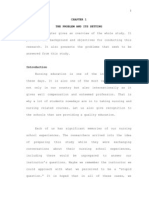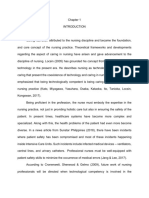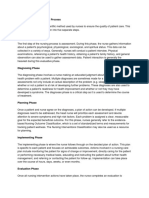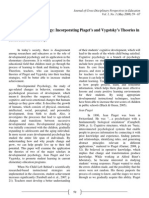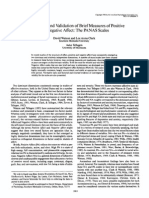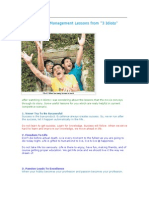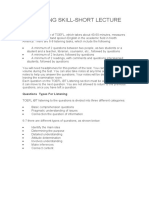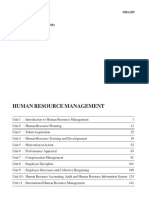Final Reflection
Final Reflection
Uploaded by
CDKalbleCopyright:
Available Formats
Final Reflection
Final Reflection
Uploaded by
CDKalbleCopyright
Available Formats
Share this document
Did you find this document useful?
Is this content inappropriate?
Copyright:
Available Formats
Final Reflection
Final Reflection
Uploaded by
CDKalbleCopyright:
Available Formats
Connie Kalble Green & Christopher UNIV 391 3 May 2012 Final Reflection: Personal Growth Through Undergraduate
Research Through my experience as an undergraduate researcher, I have had numerous encounters, conversations, discoveries, and opportunities that have inspired me to pursue a career in research through academia. Over the past three years, I have gained many skills, including leadership and mentoring opportunities. The seminar in undergraduate research, taken in conjunction with research, has challenged me not only to see my research in a different light, but has also shaped the way I view other areas of research. Through ethical practices and the pursuit of knowledge, my work as an undergraduate researcher upholds the Jesuit mission. The experience of undergraduate research should be one to be had by all, because for me it was a truly unforgettable and invaluable opportunity. As a senior lab member and lab manager, I have had experiences and opportunities many undergraduate students are not fortunate enough to have had. As a sophomore, I realized my passion for body image research and sought it out with Dr. Leon. From the beginning of my research experience with Dr. Leon, I was immersed in literature review searches and data entry, building both my knowledge base as well as my skill set. As the lab grew from three members to seven, I have had many unique experiences including onboarding and training several lab members, developing and executing a project, and
developing professional relationships at annual conferences. Through my research I have developed many skills that will carry on to my professional career. Through instances like those listed above, I have learned to effectively and efficiently communicate with large groups as well as individual participants, as well as with professionals in the field and the everyday individual. It has been very beneficial to work with software that will facilitate my entrance into the professional field as well. Lab surveys are conducted through a website, Opinio, which allows us to create, distribute, and collect all surveys and data that is then ready to be cleaned and analyzed. Technical skills such as downloading the raw data into SPSS statistical software, matching participants over time points, and cleaning the data of participants that did not complete the bulk of the survey were crucial to my learning experience. In addition to the skills I previously mentioned, I have further developed my mentoring skills. Through working with newer members of the lab, I have learned how to effectively help other lab members understand topics as well as helping them refine their professional writing skills. This experience has been very meaningful to me, as a graduating senior, as I have had great mentors in the Psychology Department, and I am now able to help others cultivate their skills. Through my contribution to the writing of two academic articles, I have learned a great deal about the construction and review process of submitting an article for publication. Through the seminar in undergraduate research, I was better able to relate my research to other coursework, conceptualize my research from other standpoints, and gain a greater appreciation of the interdisciplinary and general interest in body image and media studies. As a sociology major, it was challenging for me to relate many quantitative
skills learned in lab to studies and methods learned about in classes. In a sociology capstone course we were given complete autonomy to write on any topic of our interest. Through this opportunity, I qualitatively studied eating disorder literature on college women in the United States and United Kingdom. This project looked into the effects of measures and policies in place to prevent eating disordered behaviors and body dissatisfaction in the United States and the United Kingdom. I have used skills, such as random selection and literature searches, that I have learned in lab to facilitate the progression of my project. Through the seminar I was also able to think of body and eating pathology research in an abstract way. Research conducted on body image and eating disorders generally comes from the field of clinical psychology, evaluating risk factors and prevention and intervention programs. Media studies and sociology take a quantitative approach to studying these topics, but commonly shift the focus to content of advertisements and societal norms influencing the development of eating pathology. Similarly, I have gained a greater appreciation for the application and broad interest of eating disorder prevention and intervention. The popular media, as of recent, has focused on topics such as digital airbrushing and emaciated models in advertisements. Many have even broached the body dissatisfaction and eating pathology conversation. Through taking a seminar with students from a variety of disciplines, I have facilitated others to recognize and challenge the presence of the thin-ideal in the media and protect themselves from its harmful effects. Prior to enrolling in seminar in undergraduate research, I had experience, both in research methods classes as well as hands on experience in lab in dealing with qualitative
and quantitative research methodologies. However, this class challenged me to conceptualize body image research from a qualitative perspective. I had not, however, had any experience with community-based research. Stoecker (2005) allowed me to form ideas about research outside an academic setting. I felt a strong connection to communitybased research because they work to solve a specific problem. This is very closely related to the work that is done in evaluating rehabilitation programs for women with eating disorders, as they are a small community themselves. The readings I felt the greatest connection to were Champoux (2011) and Northouse (2009). The theories of leadership as well as crucial characteristics of a leader described by the authors were very relative to my work as a researcher and lab manager. Both authors identify transactional leadership as a primary theory. Mentors provided me with outstanding examples of leadership and through my research experiences as a leader, I find the rewards of transformational leadership to be the greatest. This not only allows an organization to thrive, but also allows for followers within the organization to grow and become inspired. I also feel, based on evidence provided by the readings, this model sets leaders and their subordinates up with the greatest opportunities for success. Undergraduate research has truly transformed me as a person. I have developed not only as a leader, but also foundationally as an individual. My interests in womens health have influenced the decisions and conversations had in daily life. I am now better able to critically view media representations of women. Before conducting research on body and eating pathology, I was aware of the severity of digital editing in the media on women, but I was not fully aware of how it affected me, as a college woman. I now find
myself devoted to learning the details of media policy, primarily from the United Kingdom. They have implemented policies that are the foundations for future policy across the globe, pulling advertisements that uphold and depict unrealistic standards from magazines and billboards. This knowledge has deterred many companies, such as Makeup Forever, from using airbrushing techniques in any of their advertisements. It has also inspired young girls to speak out against these ideals. A recent petition and protest against Seventeen Magazine was organized by a thirteen-year-old girl in North Carolina for these unrealistic standards and asking for change. My research has significantly shaped my interests in policy and my passion for media studies. Not only have personally grown through my involvement in undergraduate research, but I have also had the experience of professional development. Through working with Dr. Leon and Ashley, I have been able to competently write and expand my curriculum vitae. They have provided me with constructive criticism to further the status of my CV, and have accurately prepared me for graduate school. From working so closely with Ashley on her dissertation, I have a very accurate perception of what to expect in a Ph.D. program. I have also had the invaluable experience of presenting at professional conferences as well as undergraduate conferences. At these conferences, I have been able to not only hear about research projects going on across the country, but have also had the opportunity to mingle with full time faculty members at other institutions, forming connections that will help shape my applications for graduate school. I have also contributed to two scholarly articles that will be submitted for publication. This process has allowed me to fully gasp the difficult nature of writing and revising a manuscript, and
has even facilitated the writing of my honors thesis. These experiences will positively impact my entrance into the professional field. I am currently applying for full time research assistant positions at various institutions, with hopes of gaining more experience before graduate school. I would describe my undergraduate research opportunity as the most meaningful, invaluable experience of my undergraduate career. It has truly ignited a spark in me, enabling me to see my future career in research. Through everything from my newfound love for knowledge and inquiry to the lives one can shape as a researcher, pursuing a Ph.D. is something I am very passionate about. Through my involvement in the Leon lab, I have had the privilege of working with a graduate mentor, Ashley Rolnik. From the beginning, Ashley proved to be a caring leader, as she was always certain to take careful consideration of the individual needs and talents present in our lab. As a subordinate in lab, I always felt inspired to reach common goals. However, over the past year, I, too, am seen as a leader for the undergraduates in lab. I believe the success of our lab is inseparable from underclassmens needs, because it is their growth as researchers that will drive the success of our projects. This past semester, two underclassmen expressed interest in applying for Provost fellowships. Since I have come to know the strengths and weaknesses of the two undergraduates I mentor, I was happy to support them through reading their grant proposals, providing them with feedback, and listening to the concerns they had. Throughout the process of constantly training lab members of newer, more challenging tasks, I have made myself very open to any questions at any time of the day. I am sure to be supportive in their endeavors, carefully considering all suggestions they bring to the table. In order to
facilitate their learning, I push their abilities to foster growth as a writer, an investigator, and researcher. The undergraduates in lab now have both been awarded Provost fellowships for next year, and continue to thrive in the lab. As I will continue to work with the Leon lab into this summer, I have scheduled final training sessions for all lab members interested in attending. These sessions will include things like skills for effectively operating Opinio, an online-based survey tool, recruiting participants, and matching datasets over three timepoints. The Jesuit mission of Loyola University Chicago also shaped my undergraduate research experience. The mission states, We are Chicago's Jesuit Catholic University a diverse community seeking God in all things and working to expand knowledge in the service of humanity through learning, justice and faith. It is primarily through my involvement in research that I have been enabled to fulfill Loyolas Jesuit mission. The purpose of our research is the better the state of humanity, specifically college women, through learning. By learning the biggest risk factors to high levels of body dissatisfaction and disordered eating in college women, we can implement programs and polices to combat these issues. This also allows us to effectively structure intervention programs, thus bettering the daily lives of college women, a vulnerable population. We are pushing the boundaries of justice by reforming the way women view media. The media, as of recent, has gained a reputation for deceiving the reader by use of digital editing and unrealistic standards. We challenge women to see these injustices and to combat them in everyday life. Our ethical practices are also guided by the Jesuit mission of Loyola. Our
research is conducted to better the health patterns of college women, so we make certain to treat topics such as eating pathology with extra care. Through undergraduate research, students have the opportunity to broaden their horizons and challenge their abilities. Research has enabled me to become more inquisitive and passionate and has inspired my career choices. Students participating in undergraduate research are exposed to experiences such as professional presentations, academic manuscripts, and training new lab members. Ideally, all undergraduate students should have a research experience, as the skills learned and relationships formed are unparalleled.
You might also like
- Group Reflection EssayDocument2 pagesGroup Reflection Essayapi-296787867No ratings yet
- Bus4090 Term PaperDocument11 pagesBus4090 Term PaperJosh GichohiNo ratings yet
- Thesis Proposal FormatDocument23 pagesThesis Proposal FormatJeanilynTanNo ratings yet
- Powerpoint For Final DefenseDocument40 pagesPowerpoint For Final DefenseCharlene Bautista LanzagaNo ratings yet
- BSN 3a2 A - Chap 1 3Document32 pagesBSN 3a2 A - Chap 1 3Pollen Siega BunalNo ratings yet
- Research Clinical Instructors RevisedDocument28 pagesResearch Clinical Instructors RevisedKateMighty AgbalogNo ratings yet
- Advance Nursing ResearchDocument44 pagesAdvance Nursing ResearchJester RafolsNo ratings yet
- Question ResearchDocument10 pagesQuestion ResearchJaleta AhmedNo ratings yet
- Teaching Plan SampleDocument4 pagesTeaching Plan SampleKrizhel Mirja CawasNo ratings yet
- Nursing Thesis ExampleDocument10 pagesNursing Thesis ExampleLyka Milo AvilaNo ratings yet
- Correlation of The Academic and Clinical PerformanDocument10 pagesCorrelation of The Academic and Clinical PerformanissaiahnicolleNo ratings yet
- Chapter 04 Determinants of Learning HandoutsDocument6 pagesChapter 04 Determinants of Learning HandoutsChris Deniel BaldozaNo ratings yet
- Characteristics of Nurse: Prepared By: Azhin Osman Supervisor: Dr. BarzanDocument6 pagesCharacteristics of Nurse: Prepared By: Azhin Osman Supervisor: Dr. BarzanAzhin O MuhammadNo ratings yet
- Lourlyn's Angels?Document27 pagesLourlyn's Angels?lovelove DayoNo ratings yet
- Managing Patient CareDocument32 pagesManaging Patient CarePascaleNo ratings yet
- Research DesignDocument4 pagesResearch DesignAbdul BasitNo ratings yet
- Knowledge and Attitude of Nursing Students Towards ResearchDocument4 pagesKnowledge and Attitude of Nursing Students Towards ResearchInternational Journal of Innovative Science and Research TechnologyNo ratings yet
- ICU - General Care Assignment IDocument9 pagesICU - General Care Assignment IAndré Alves100% (1)
- Guide To Review of Basic Nursing Curriculum (WHO) PDFDocument53 pagesGuide To Review of Basic Nursing Curriculum (WHO) PDFLliryc Sotnas OleusnocNo ratings yet
- Factors Influencing Community Participation in Healthcare ProgramsDocument40 pagesFactors Influencing Community Participation in Healthcare ProgramsBest Research50% (2)
- Activity 1. Conceptualizing A Research StudyDocument7 pagesActivity 1. Conceptualizing A Research StudyKarl DeniceNo ratings yet
- "A Leader Is One Others Follow Willingly and Voluntarily": Passive Aggressive AssertiveDocument4 pages"A Leader Is One Others Follow Willingly and Voluntarily": Passive Aggressive AssertiveYucef Bahian-AbangNo ratings yet
- Bachelor of Science in NursingDocument19 pagesBachelor of Science in Nursingjigz010No ratings yet
- Reflection-Research PaperDocument9 pagesReflection-Research Paperapi-370649084No ratings yet
- THESi S!!!!!!!!!!!Document8 pagesTHESi S!!!!!!!!!!!Jomar Jerome SinsonNo ratings yet
- Padilla - The Lived Experiences of Frontline Nurses During The Coronavirus Disease 2019 (COVID-19) Pandemic in Qatar: A Qualitative StudyDocument11 pagesPadilla - The Lived Experiences of Frontline Nurses During The Coronavirus Disease 2019 (COVID-19) Pandemic in Qatar: A Qualitative StudyNicole PadillaNo ratings yet
- For Printing Final PaperDocument112 pagesFor Printing Final Paperハニファ バランギNo ratings yet
- Activity Based Teaching StrategiesDocument14 pagesActivity Based Teaching StrategiesNicole Anne TuazonNo ratings yet
- Ethical Consideration in Leadership and ManagementDocument6 pagesEthical Consideration in Leadership and ManagementGlizzle MacaraegNo ratings yet
- The Impact of Misinformation and Educational Attainment in The Vaccine Hesitancy of The FilipinosDocument56 pagesThe Impact of Misinformation and Educational Attainment in The Vaccine Hesitancy of The FilipinosvenusmonteverosNo ratings yet
- Ncma 216 (Pharmacology) : Bachelor of Science in NursingDocument9 pagesNcma 216 (Pharmacology) : Bachelor of Science in NursingLeo Santos MagnoNo ratings yet
- 2014 Orem Program Development PaperDocument16 pages2014 Orem Program Development Paperapi-310557802No ratings yet
- Comfort Measures: A Concept Analysis: Irene Oliveira, RN, BSCNDocument21 pagesComfort Measures: A Concept Analysis: Irene Oliveira, RN, BSCNLina Mahayaty SembiringNo ratings yet
- Final Integrative ReviewDocument24 pagesFinal Integrative Reviewapi-328315559No ratings yet
- Ca1 Pen SyllabusDocument6 pagesCa1 Pen SyllabusJoseph Bahian-AbangNo ratings yet
- VariablesDocument2 pagesVariablesRoma GilberoNo ratings yet
- Healing The Divide: Navigating Healthcare Inequities in The PhilippinesDocument7 pagesHealing The Divide: Navigating Healthcare Inequities in The PhilippinesClarence guirit100% (1)
- Research Samples and ExplanationsDocument56 pagesResearch Samples and ExplanationsJes SelNo ratings yet
- Research MCNPDocument57 pagesResearch MCNPmarie judimor gomezNo ratings yet
- Revised Thesis 4.0 PDFDocument51 pagesRevised Thesis 4.0 PDFAubrey Unique EvangelistaNo ratings yet
- Teenage Pregnancy Study in The PhilippinesDocument9 pagesTeenage Pregnancy Study in The PhilippinesLucky EnriquezNo ratings yet
- Nursing Research LectureDocument52 pagesNursing Research LectureKimTot OctavianoNo ratings yet
- Breast Self-Examination in Terms of Knowledge, Attitude, andDocument12 pagesBreast Self-Examination in Terms of Knowledge, Attitude, andSameer Ahmad100% (1)
- Smoking: Psychological and Social Influences: One-Of-A-Kind MenswearDocument12 pagesSmoking: Psychological and Social Influences: One-Of-A-Kind MenswearBernardo Villavicencio VanNo ratings yet
- What Are Qualities of A Good ResearcherDocument4 pagesWhat Are Qualities of A Good Researchermohamud abdirahman hirsiNo ratings yet
- Informed Consent Form: University of Cebu Research OfficeDocument3 pagesInformed Consent Form: University of Cebu Research OfficeJayson CalNo ratings yet
- Collection Books by Cronbach's Alpha PDFDocument4 pagesCollection Books by Cronbach's Alpha PDFMarjun Carreon Abear100% (1)
- FORMAT For Research ProposalDocument14 pagesFORMAT For Research ProposalsenyorakathNo ratings yet
- Rights of The Research ParticipantsDocument1 pageRights of The Research Participantsapi-282413899No ratings yet
- Qualitative Case StudyDocument7 pagesQualitative Case StudyPERLITA BERINANo ratings yet
- Instant Alert For Myocardial Infarction Keshav Singhal Shri Vaishnav Institute of Tech. & Science Indore EMAIL ADD: Keshav - Svits@yahoo - Co.inDocument7 pagesInstant Alert For Myocardial Infarction Keshav Singhal Shri Vaishnav Institute of Tech. & Science Indore EMAIL ADD: Keshav - Svits@yahoo - Co.inKeshav SinghalNo ratings yet
- The 5 Steps of The Nursing ProcessDocument2 pagesThe 5 Steps of The Nursing ProcessManish DafdaNo ratings yet
- NLM Module-1Document13 pagesNLM Module-1Angel Cauilan100% (1)
- Teaching Practicum Smart Outcomes PortfolioDocument8 pagesTeaching Practicum Smart Outcomes Portfolioapi-360345296No ratings yet
- Biostatistics in RTDocument2 pagesBiostatistics in RTJA KENo ratings yet
- Spiritual Nursing SyllabusDocument1 pageSpiritual Nursing SyllabusVincent Quiña PigaNo ratings yet
- GenitoUri Post TestDocument5 pagesGenitoUri Post Testlourd nabNo ratings yet
- Honors Reflection Master 1Document11 pagesHonors Reflection Master 1api-661465000No ratings yet
- PHD MotivationDocument3 pagesPHD MotivationtamNo ratings yet
- Portfolio Ma Project ReflectionDocument3 pagesPortfolio Ma Project Reflectionapi-243287735No ratings yet
- Neuro-Transmitter Questionnaire: Determining Your Dominant NatureDocument6 pagesNeuro-Transmitter Questionnaire: Determining Your Dominant NatureBrad100% (1)
- Chapter 15 Mergers and Acquisitions, Restructuring and DownsizingDocument7 pagesChapter 15 Mergers and Acquisitions, Restructuring and DownsizingLuke ThomasNo ratings yet
- PSY 101 Course OutlineDocument4 pagesPSY 101 Course OutlineImdad JeshinNo ratings yet
- Piaget Vs VygotskyDocument9 pagesPiaget Vs Vygotskyapi-272037951100% (3)
- Exercise Addiction A Literature ReviewDocument7 pagesExercise Addiction A Literature Reviewc5sq1b48100% (1)
- Mastering Inner Leadership - Fairholm.ebsDocument8 pagesMastering Inner Leadership - Fairholm.ebsĐỗ Lê DuyNo ratings yet
- Stress and Health: Research and Clinical Applications: January 2000Document22 pagesStress and Health: Research and Clinical Applications: January 2000Marcus VoNo ratings yet
- Case 20-2020: A 7-Year-Old Girl With Severe Psychological Distress After Family SeparationDocument9 pagesCase 20-2020: A 7-Year-Old Girl With Severe Psychological Distress After Family SeparationUmar WijaksonoNo ratings yet
- Online Gaming Addiction in Children andDocument43 pagesOnline Gaming Addiction in Children andjelly turcoNo ratings yet
- Mental Block WorkbookDocument16 pagesMental Block Workbookwilligis bondhan wicaksono100% (1)
- Why Mediation in The Workplace:: Mediation Brings People Together To Proactively Resolve Their DisputesDocument3 pagesWhy Mediation in The Workplace:: Mediation Brings People Together To Proactively Resolve Their DisputesadrianfifaNo ratings yet
- Lesson Plan HandballDocument7 pagesLesson Plan Handballapi-308413763100% (1)
- Watson (1988) - Development and Validation of Brief Measures of Positive and Negative Affect The PANAS ScalesDocument8 pagesWatson (1988) - Development and Validation of Brief Measures of Positive and Negative Affect The PANAS ScalesElwood BluesNo ratings yet
- Family HandbookDocument3 pagesFamily Handbookapi-414657139No ratings yet
- Reference Letters - Template For Writing OneDocument6 pagesReference Letters - Template For Writing Onedaitkensmith4330No ratings yet
- Management Lessons From 3 Idiots MovieDocument3 pagesManagement Lessons From 3 Idiots MoviempgthorNo ratings yet
- Aviation Safety ReviewDocument8 pagesAviation Safety ReviewWeda Maicel MollanedaNo ratings yet
- Culture Bound SyndromesDocument15 pagesCulture Bound SyndromesFranclem TecsonNo ratings yet
- Chapter 1 Organizational BehaviourDocument15 pagesChapter 1 Organizational BehaviourNurfatihah YusuffNo ratings yet
- Nurs 3020 Midterm EvaluationDocument8 pagesNurs 3020 Midterm Evaluationapi-372418362No ratings yet
- Introduction To The History of Psychology 7th Edition Hergenhahn Test Bank 1Document8 pagesIntroduction To The History of Psychology 7th Edition Hergenhahn Test Bank 1dorothy100% (56)
- Training Module On Personality DevelopmentDocument19 pagesTraining Module On Personality DevelopmentHaris Palpola100% (24)
- Course Handout (Part-II) II SEMESTER (2017-18) Course Handout (Part-II) II SEMESTER (2017 - 18) Course Handout (Part-II) II SEMESTER (2017 - 18)Document3 pagesCourse Handout (Part-II) II SEMESTER (2017-18) Course Handout (Part-II) II SEMESTER (2017 - 18) Course Handout (Part-II) II SEMESTER (2017 - 18)Tussank GuptaNo ratings yet
- Principles of Pastoral Counseling - 240320 - 184812Document35 pagesPrinciples of Pastoral Counseling - 240320 - 184812lloyd edson bepuraNo ratings yet
- Listening Skill-Short LectureDocument2 pagesListening Skill-Short LectureAnnisa HingisNo ratings yet
- Mba205 HRMDocument158 pagesMba205 HRMyogeshgharpure100% (1)
- Handout 21 (McGinn)Document2 pagesHandout 21 (McGinn)zmuadhNo ratings yet
- Careerguide - Professional Skill Assessment Report - APDocument2 pagesCareerguide - Professional Skill Assessment Report - APRahul VermaNo ratings yet
- Behaviourists Believe That All Behaviour... 16 MarkerDocument2 pagesBehaviourists Believe That All Behaviour... 16 MarkerjxzzNo ratings yet
- Lo3 - QUESTIONS AND ANSWERSDocument29 pagesLo3 - QUESTIONS AND ANSWERSisraaNo ratings yet





